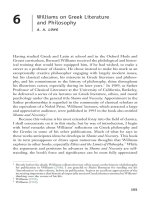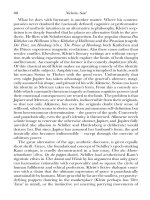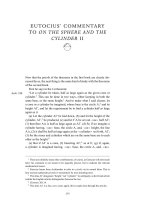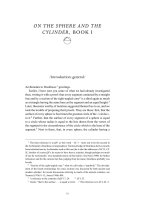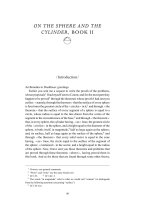Williams on Greek Literature and Philosophy
Bạn đang xem bản rút gọn của tài liệu. Xem và tải ngay bản đầy đủ của tài liệu tại đây (154.61 KB, 26 trang )
P1: SBT
9780521662161c06 CUNY946/Thomas 978 0 521 66216 1 July 11, 2007 14:3
6
Williams on Greek Literature
and Philosophy
A. A. LONG
Having studied Greek and Latin at school and in the Oxford Mods and
Greats curriculum, Bernard Williams received the philological and histor-
ical training that would have equipped him, if he had wished, to make a
career as a professor of classics. He chose instead to make his mark as an
exceptionally creative philosopher engaging with largely modern issues,
but his classical education, his interests in Greek literature and philoso-
phy, and his commitment to the history of philosophy, shine throughout
his illustrious career, especially during its later years.
1
In 1989, as Sather
Professor of Classical Literature at the University of California, Berkeley,
he delivered a series of six lectures on Greek literature, ethics, and moral
psychology under the general title Shame and Necessity. Appointment to the
Sather professorship is regarded in the community of classical scholars as
the equivalent of a Nobel Prize. Williams’ lectures, which attracted a large
and appreciative audience, were published in 1993 in the book also entitled
Shame and Necessity.
2
Because this volume is his most extended foray into the field of classics,
I shall concentrate on it in this study; but by way of introduction, I begin
with brief remarks about Williams’ reflections on Greek philosophy and
the Greeks in some of his other publications. Much of what he says in
these works anticipates ideas he develops in Shame and Necessity. This book
in its turn presupposes or draws upon numerous thoughts that Williams
explores in other books, especially Ethics and the Limits of Philosophy.
3
While
the arguments and positions he advances in Shame and Necessity are self-
standing, the book’s force and significance can be most fully appreciated
1
Shortly before his death, Williams collected twenty of his essays on the history of philosophy
for publication in Williams (2006). I am grateful to Myles Burnyeat for sending me his
‘Introduction’ to this volume, before its publication. It gives an excellent appreciation of the
increasing importance that historical (especially ancient Greek) themes assumed in Williams’
thinking over the course of his life.
2
Williams (1993).
3
Williams (1985).
155
P1: SBT
9780521662161c06 CUNY946/Thomas 978 0 521 66216 1 July 11, 2007 14:3
156
A. A. Long
when it is set in the context of the philosophical and historical interests that
chiefly occupied him during the last three decades of his life.
1. WILLIAMS’ WRITINGS BEFORE SHAME AND NECESSITY
In 1981, Williams published an extensive account of Greek philosophy for
The Legacy of Greece: A New Appraisal.
4
He finds the Greek philosophers
(by whom he means primarily Plato and Aristotle) not only starting but
also distinguishing “what would still be recognized as many of the most
basic questions” in almost all the major fields of subsequent philosophy.
5
As radical exceptions to this generalization he identifies perhaps “just two
important kinds of speculation”: idealism “according to which the entire
world consists of the contents of mind,” and historicist explanations of
mental categories, as in Marxism or historical consciousness.
6
Williams focuses this account of Greek philosophy on metaphysics,
epistemology, and ethics. Starting, in the case of the latter, with Socrates’
attempts in Plato’s Republic to refute Thrasymachus’ “entirely egoistic con-
ception of practical rationality,” Williams observes that the Thasymachean
position derived some of its historical grounding and appeal from the “aris-
tocratic or feudal morality” evidenced in the competitive success highly
valued by Homeric heroes. For such a morality, he observes, “shame is a
predominant notion, and a leading motive the fear of disgrace, ridicule, and
the loss of prestige.”
7
However, we should not suppose that shame is only
occasioned by failures in competitive and self-assertive exploits; for it may
also be prompted by “a failure to act in some expected self-sacrificing or
co-operative manner”:
The confusion of these two things [i.e. the value set on competitive success
and the occasion for shame] is encouraged by measuring Greek attitudes
by the standard of a Christian ...outlook. That outlook associates moral-
ity simultaneously with benevolence, self-denial, and inner directedness
or guilt (shame before God or oneself). It sees the development of moral
thought to this point as progress, and it tends to run together a number
of different ideas which have been discarded – or at least rendered less
reputable – by that progress.
8
4
Williams (1981a).
5
Williams (1981a), p. 202.
6
Williams (1981a), pp. 204–205.
7
Williams (1981a), p. 243.
8
Williams (1981a), p. 244.
P1: SBT
9780521662161c06 CUNY946/Thomas 978 0 521 66216 1 July 11, 2007 14:3
Williams on Greek Literature and Philosophy
157
This dense passage, when read retrospectively, can be seen as setting much
of the agenda for Shame and Necessity, especially that later book’s close
attention to Homer, the recognition that shame can motivate cooperative
as well as competitive action, the pejorative assessment of a Christian moral
outlook, and criticism of the progressivist moral attitude for being confused
and irrelevant to much human experience. But Williams devotes most of
his treatment of Greek ethics in The Legacy of Greece to a largely positive
appraisal of the view of morality defended by Socrates, Plato, and Aristotle.
He seems to approve Plato for rejecting “an instrumental or contrac-
tual view of morality” and for trying to show “that it was rational for each
person to want to be just, whatever his circumstances.”
9
Taking this project
to be neither “a moralizing prejudice on Plato’s part,” still less a Kantian
“autonomous demand which cannot be rationalized or explained by any-
thing else,” Williams takes Plato’s position to “be grounded in an account
of what sort of person it was rational to be,” or “to show that each man has
good reason to act morally, and that the good reason has to appeal to him in
terms of something about himself.”
10
Here we already get a foreshadowing
of Williams’ insistence in Ethics and the Limits of Philosophy on the necessity
for a satisfactory ethical imperative to address internal reasons, first per-
son deliberations and interests, and facts to do with an agent’s character,
as distinct from presenting themselves as external impositions and purely
objective obligations.
Williams in The Legacy of Greece finds certain aspects of Greek ethics
problematic: for instance, the Socratic ideal that a clear-headed person
always has “stronger reasons to do acts of justice . . . rather than acts of mean
temporal self-interest,” or Aristotle’s “rational integration of character.”
11
Summing up, however, he concludes that in many respects “the ethical
thought of the Greeks was not only different from most modern thought,
particularly modern thought influenced by Christianity, but was also in
much better shape”:
It has, and needs, no God. . . . It takes as central and primary questions of
character, and of how moral considerations are grounded in human nature: it
asks what life it is rational for the individual to live. It makes no use of a blank
categorical imperative. In fact – though we have used the word “moral” quite
often for the sake of convenience – this system of ideas basically lacks the
9
Similarly, Williams (1985), pp. 30–1, although in this later treatment of the same points
Williams’ approval of Plato is more qualified.
10
Williams (1981a), p. 246.
11
Williams (1981a), pp. 249–250.
P1: SBT
9780521662161c06 CUNY946/Thomas 978 0 521 66216 1 July 11, 2007 14:3
158
A. A. Long
concept of morality altogether, in the sense of a class of reasons or demands
which are vitally different from other kinds of reason or demand . . .
Relatedly, there is not a rift between a world of public “moral rules”
and of private personal ideals: the questions of how one’s relations to others
are to be regulated, both in the context of society and more privately, are
not detached from questions about the kind of life it is worth living, and of
what it is worth caring for.
12
Williams acknowledges that the Greek philosophers’ application of this
outlook is neither fully recoverable nor fully admirable: we cannot inhabit
a Greek city-state, and we certainly should not endorse Greek attitudes to
slavery and women. In addition, he finds that Greek ethical thought, like
“most ethical outlooks subsequently,” rested upon an “objective teleology
of human nature,” which “we are perhaps more conscious now of having
to do without than anyone has been since some fifth-century Sophists first
doubted it.” Even so, he approves Greek philosophical ethics for repre-
senting “one of the very few sets of ideas which can help now to put moral
thought into honest touch with reality.”
13
In the final page of his contribution to The Legacy of Greece,Williams
turns from Greek philosophy to tragedy; and here, as in his brief remarks
on the Homeric world, he adumbrates ideas he will strongly develop in
Shame and Necessity, and which will also resonate in Ethics and the Limits of
Philosophy.
14
Whereas Greek philosophy, “in its sustained pursuit of rational
self-sufficiency” seeks to insulate the good life from chance, Greek litera-
ture, above all tragedy, offers us a sense “that what is great is fragile and
that what is necessary may be destructive.”
15
This page, like parts of those
later books, is strongly marked by his qualified endorsement of Nietzsche.
Granted the range, the power, the imagination and inventiveness of the
Greek foundation of Western philosophy, it is yet more striking that we
can take seriously, as we should, Nietzsche’s remark: “Among the great-
est characteristics of the Hellenes is their inability to turn the best into
reflection.”
16
12
Williams (1981a), p. 251.
13
Williams (1981a), p. 252.
14
Williams (1981a), p. 253.
15
Both in Williams (1981a), p. 248, and in Williams (1985), p. 34, Williams raises against
Plato’s Socrates the telling question that “if bodily hurt is no real harm” to the good
man, why are we strongly required by virtue not to harm other people’s bodies? Williams’
scepticism about the possibility of freeing morality from chance, first articulated in Williams
(1981b) becomes an important theme in Shame and Necessity.
16
Williams (1981a), p. 253.
P1: SBT
9780521662161c06 CUNY946/Thomas 978 0 521 66216 1 July 11, 2007 14:3
Williams on Greek Literature and Philosophy
159
The Sather lectures that generated Shame and Necessity,asweshall
shortly see, gave Williams an opportunity to expatiate on Nietzsche’s dic-
tum, an opportunity he clearly relished; for the most notable feature of
that book is Williams’ sympathetic engagement with the implicit ethics and
psychology of Homer and the Greek tragedians. Equally notable in Shame
and Necessity, and in surprisingly sharp contrast to his chapter in The Legacy
of Greece,isthe strongly critical posture he adopts in relation to the moral
psychology of the Greek philosophers, especially Plato. To understand this
shift, we need to take account of his sceptical challenges to what he calls
“morality” or “the moral system,” as articulated in Ethics and the Limits of
Philosophy, the book that he wrote after his chapter in The Legacy of Greece
and before Shame and Necessity.
Ethics and the Limits of Philosophy, building on many of Williams’ earlier
studies, is a vigorous challenge to the coherence, psychological plausibility,
and practicality of contemporary moral philosophy. Although he discusses
numerous “styles of ethical theory,” the principal target of his critique is “the
special notion of moral obligation,” inherited from Kant, which he charac-
terizes as “the outlook, or, incoherently, part of the outlook, of almost all
of us.” The many problems Williams has with the concept of moral obli-
gation include its categorical claims to trump all other kinds of motivation,
its focus on a supposedly autonomous will undetermined by particular per-
sons’ dispositions, interests, and social roles, and, in sum, its insulation from
their lived experience as members of a community with an outlook that is
both partly shared but also meaningfully individual. This book presents a
wholesale challenge to the idea that philosophical reflection, just by itself,
can generate ethical norms and shape people’s outlook in abstraction from
their social context and psychological particularities.
Williams approaches his criticism of “the morality system,” as so char-
acterized, by contrasting it in the above respects with Greek philosophical
ethics. Yet, right from the outset of his book he raises doubts about whether
any moral philosophy, including that of the Greeks, “can reasonably hope to
answer” the question of “how one should live.”
17
None the less, he identifies
that Socratic question as “the best place for moral philosophy to start,” in
as much as the question, in its generality, is noncommittal about any specif-
ically “moral” considerations or assumptions about duty or goodness.
18
In
Williams’ terms, the Socratic question pertains to “ethics” rather than to
17
Williams (1985), p. 1.
18
Williams (1985), p. 4.
P1: SBT
9780521662161c06 CUNY946/Thomas 978 0 521 66216 1 July 11, 2007 14:3
160
A. A. Long
“morality,” which he uses as his name for the narrow kind of ethics that
emphasizes the notion of obligation.
Williams grants, as he must, that the life approved in Greek philosoph-
ical ethics had to be a “good” life and a “whole” life, marked by virtues –
admirable dispositions of character. (In the time since he wrote Ethics and
the Limits of Philosophy, virtue, with strong influence from Aristotle, has
become a major topic of contemporary moral philosophy.) What he espe-
cially approves in that book is that, in asking the Socratic question, the
Greek philosophers did not presuppose “respectable justifying reasons” in
answering it.
19
However, because the “ethical,” as Williams uses the expres-
sion, pertains to considerations that go beyond self-interest, the Socratic
question is hardly as free from such presuppositions as he suggests.
Plato, and especially Aristotle, take centre stage in the third chapter
entitled “Foundations: Well-Being.” As in The Legacy of Greece,Williams
approves Greek philosophical ethics for its rational, non-religious appeals
to persons in terms of the structure of the self, showing that “it was rational
to pursue a certain kind of life or to be a certain sort of person.”
20
Aristotle
in particular is singled out as providing in his Ethics “the paradigm of an
approach that tries to base ethics on considerations of well-being and of
a life worth living.”
21
But what of persons who are not impressed by the
Aristotelian treatment of these considerations? Williams correctly observes
that Aristotle, owing to his teleology of human nature, must say that they
misconceive their real interests. Yet, that rejoinder, Williams plausibly says,
opens a highly problematic gap between the person’s own point of view and
“our” view of his or her interests. Moreover, he continues, the complexity
and diversity of the modern world, together with what we don’t know about
psychological health, vastly complicate any prospects for an Aristotelian
harmonisation of internal ethical dispositions with external values and the
outside point of view. Williams concludes this chapter with the following
observations:
Aristotle saw a certain kind of ethical, cultural, and indeed political life
as a harmonious culmination of human potentialities, recoverable from an
absolute understanding of nature. We have no reason to believe in that. We
understand – and most important, the agent can come to understand – that
the agent’s perspective is only one of many that are equally compatible with
human nature, all open to various conflicts with themselves and with other
19
Williams (1985), p. 19.
20
Williams (1985), p. 34.
21
Williams (1985), ibid.
P1: SBT
9780521662161c06 CUNY946/Thomas 978 0 521 66216 1 July 11, 2007 14:3
Williams on Greek Literature and Philosophy
161
cultural aims ...We must admit that the Aristotelian assumptions which
fitted together the agent’s perspective and the outside view have collapsed.
No one has yet found a good way of doing without those assumptions. That
is the state of affairs on which the argument of this book will turn.
22
In Shame and Necessity,towhich I now turn, Williams looks back beyond
Plato and Aristotle to Homer and the tragedians, whose work was
untouched by philosophy in the sense of a special type of discourse and
inquiry that Plato was the first to inaugurate fully. In that material, he finds
evidence for an ethical outlook that escapes his strictures against moral phi-
losophy in Ethics and the Limits of Philosophy thanks to its ways of integrating
the agent’s perspective and the outside view.
2. SHAME AND NECESSITY: THE CRITIQUE OF “PROGRESSIVISM”
Williams sets the scene for his project in the first chapter of Shame and
Necessity, entitled “The Liberation of Antiquity.”
23
What he wants to liber-
ate the ancient Greeks from is a “progressivist account,” according to which
“the Greeks had primitive ideas of action, responsibility, ethical motiva-
tion, and justice, which in the course of history have been replaced by a
more complex and refined set of conceptions that define a more mature
form of ethical experience.”
24
Instancing moral guilt, moral agency, and “a
proper conception of the will” as ideas that the progressivist account finds
the Greeks lacking, Williams argues that our own lack of clarity about these
ideas undermines the progressivist claim that we are thereby in better shape
for having them. He does not discountenance all progress, “notably to the
extent that the idea of human excellence” has been freed from determina-
tion by social position and gender.
25
None the less he proposes that the
Greeks were actually better off for having different ethical ideas from those
instanced earlier, and, furthermore, that we shall be better off by coming
to realize how much we rely, though without acknowledgement, on their
conceptions rather than those of the progressivists.
22
Williams (1985), p. 52.
23
Throughout the volume, he looks back to E. R. Dodds, whose Sather Lectures of 1949 were
published in his remarkable book, Dodds (2004). Dodds, as Regius Professor of Greek at
Oxford, had a profound influence on Williams (see his expression of homage in Williams
(1993), xi). Taken together their two books, though very different in their methodology and
assessments of where we stand in relation to the Greeks, represent and equally challenging
set of perspectives.
24
Williams (1993), p. 5.
25
Williams (1993), pp. 6–7.
P1: SBT
9780521662161c06 CUNY946/Thomas 978 0 521 66216 1 July 11, 2007 14:3
162
A. A. Long
This is a very large and bold agenda. Before seeing how Williams works
it out in the succeeding chapters, some clarifications and questions are in
order. First, the Greeks whose ethical outlook Williams would have us
approve are a very small set of authors, predominantly Homer, the three
Attic tragedians, and Thucydides. In this book Plato and Aristotle come
in for as much criticism as the progressivist account, and partly for similar
reasons. Moreover, Greek reflection on ethics proceeded apace in post-
Aristotelian philosophy with the highly influential schools of Stoicism and
Epicureanism. Williams’ Greeks do not include these later figures at all, nor
does he draw on such major writers from the classical period as Herodotus,
or Aristophanes, or Demosthenes. He does not explain his selection of
material, but it soon becomes clear that his approvable Hellenes, notwith-
standing his many generalizations about “the Greeks,” are precisely and
only those early authors whom he takes to adumbrate the ethical outlook
he independently recommends.
A reader who knows the scholarship that Williams labels progressivist
will find his generalizations about it too breezy to do full justice to the
two figures whose influential work he chiefly has in mind. One of these
scholars, Bruno Snell, we shall come to in discussing the second chapter
of Shame and Necessity. The other is Arthur Adkins, author of Merit and
Responsibility. A Study in Greek Values and other related works.
26
Williams
makes it clear that Adkins is the leading target of his attack on the view that
our own moral outlook has greatly progressed beyond that of the (early)
Greeks. Yet, instead of letting Adkins speak for himself, Williams largely
confines his mentions of Adkins’ work to footnotes, giving the reader of
his main text the impression that Adkins convicts “the Homeric shame
culture” of “basic egoism.”
27
In fact, Adkins’ book is less grounded on
progressivist premises than Williams implies. Its starting point is not a claim
that we today are in better ethical shape than the Homeric Greeks, but the
proposition, which Williams himself more or less admits, that “we are all
Kantians now.”
28
Adkins does not set out to justify our Kantian outlook,
but to understand why “there should exist a society so different from our
own as to render it impossible to translate ‘duty’ in the Kantian sense into
its ethical terminology at all.”
29
Moreover, Adkins and Williams actually agree on the importance of
interpreting ethical concepts in terms of social realities as distinct from
26
Adkins (1960). Adkins acknowledges his strong indebtedness to the work and influence of
Dodds (see n. 23), Adkins (1960), p. vi.
27
Williams (1993), p. 81.
28
Adkins (1960), p. 2; Williams (1985), p. 174.
29
Adkins (1960), p. 2.
P1: SBT
9780521662161c06 CUNY946/Thomas 978 0 521 66216 1 July 11, 2007 14:3
Williams on Greek Literature and Philosophy
163
making them logically primary. Thus it is central to Adkins’ argument that
the shame culture he finds pervasive in Homer is a system of values that
“suit Homeric society, inasmuch as they commend those martial qualities
which most evidently secure its existence.”
30
Williams is able to show that
Adkins’ account of Homeric shame is far too rigid to capture the subtlety
and diachronic relevance of Homeric values, and he is right to character-
ize Adkins as someone who unsurprisingly thinks that moral thought has
“advanced” in the period since early Greek antiquity. But neither Adkins nor
the many others who share that position are as neatly captured by Williams’
progressivist label as his rhetorical use of it implies.
Another question that arises from Williams’ “Liberation of Antiquity”
concerns his claim that we modern westerners have a special relation to the
(early) Greeks:
They do not merely tell us about themselves. They tell us about us. They
do that in every case in which they can be made to speak, because they tell
us who we are.
31
Strongly distancing himself from the anthropological fashion of emphasiz-
ing the Greeks’ “otherness,” Williams insists that “the modern world was
a European creation presided over by the Greek past” (3).
32
Although he
grants “the formative influence” and “overwhelming role” of Christianity
and the impossibility of thinking of people who would be ourselves inde-
pendently of Christianity, he finds it worthwhile to imagine a route from
fifth-century Greece to the present that did not run through Christian-
ity. This is a very curious thought experiment; for it is equally possible to
imagine a route to the present in which Rome shaped us more powerfully
than Greece did, as in fact it did for our pre-Renaissance ancestors. The
Greek bedrock of our modern identity is hardly more determinate than
our Christian heritage, and Williams’ claim about the Greek presidency
does not include the massively influential Plato and Aristotle but earlier
authors untouched by philosophy. It is, then, a highly selective Greek past
that he wants us to find “specially the past of modernity.” Thus he gets a
basic premise for his argument that, by recovering the early Greek ethical
outlook, we can not only avoid the errors of progressivist philosophy but
also achieve a better grip on our basic human identity.
What he means by both these propositions begins to emerge most
clearly and eloquently in his introductory observations on Greek tragedy.
30
Adkins (1960), p. 55.
31
Williams (1993), pp. 19–20.
32
Williams (1993), p. 3.
P1: SBT
9780521662161c06 CUNY946/Thomas 978 0 521 66216 1 July 11, 2007 14:3
164
A. A. Long
Rather than approach tragedy as if it were simply philosophy, he locates the
relevance of these dramas to his project in two related facts – first, their rep-
resenting, but not expounding, such ideas as necessity and responsibility, and
second, their embeddedness in the historical context of Athenian society,
whose conflicts, tensions, concepts, and images they reflect. I take him to be
saying that tragedy’s innocence of formal philosophy enables it to register
human experience in ways that cut directly to psychological data that we
can all recognize to be germane to ourselves. He meets the objection that
the tragedies draw on religious ideas quite alien to us with the following
retort:
What the tragedies demand is that we should look for analogies in our
experience and our sense of the world to the necessities they express.
33
Undeniably, modern readers and audiences do respond enthusiastically to
the Greek tragedians, albeit generally through the treacherous medium
of translation. Williams is asking the fascinating question of how that is
possible in view of the cultural distance between us and them. The answer
he develops in Shame and Necessity is that, notwithstanding the cultural
distance, especially Greek concepts of supernatural intervention, “our ideas
of action and responsibility and other of our ethical concepts are closer to
those of the ancient Greeks than we usually suppose.”
34
3. PROGRESSIVISM AND PSYCHOLOGICAL EXPLANATIONS
Some of the doubts one might have about Williams’ project, as announced in
the first chapter of Shame and Necessity, are brilliantly resolved in the book’s
second chapter, “Centers of Agency.” Here he argues, with excellently cho-
sen examples, that the Homeric epics invoke an ethical outlook and implicit
psychology that we intuitively recognize to be coherent and salient, pro-
vided we do not complicate our responses by worrying about concepts that
are absent. These concepts include (1) the distinction between soul and
body, (2) the idea of the will as a mental action mediating between decision
and doing something, and (3) the notion that mental functions with regard
to action derive their significance from ethics. Such concepts, Williams
argues, are all “accretions of misleading philosophy.”
35
Far from Homer’s
33
Williams (1993), p. 19.
34
Williams (1993), p. 16.
35
Williams (1993), p. 21.
